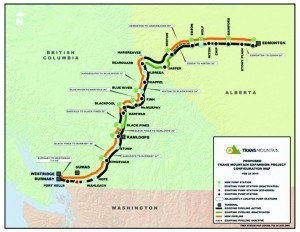
The federal government approved Kinder Morgan’s Trans Mountain pipeline expansion, Nov. 29.
The $6.8-billion project envisions tripling the amount of oil transported by pipeline running directly through Jasper National Park (JNP). The expansion would include building approximately 987 km of new pipeline from Edmonton to Burnaby, B.C. and reactivating 193 kms of existing pipeline, some of which was built in Jasper National Park in 1953.
Once completed, the twinning will allow 890,000 barrels of oil to pass through the park a day, nearly three times the amount that travels through it today.
The expansion was conditionally approved in May by the National Energy Board, but must meet 157 conditions, including 49 environmental requirements, before Kinder Morgan can twin the 1,150 km pipeline.
In addition to approving Kinder Morgan’s pipeline, Prime Minister Trudeau nixed Enbridge’s Northern Gateway pipeline that would run through the Great Bear Rainforest to Kitimat, B.C., but approved the company’s Line 3 application, which will replace and double the capacity of a half-century-old pipeline from Alberta to Wisconsin.
The prime minister also reiterated the government’s promise to ban oil tankers on British Columbia’s northern coast.
“Ultimately this is about leaving a better country for our kids than the one we inherited from our parents,” Trudeau told a news conference in Ottawa. “We took this decision because we believe it is in the best interest of Canada and Canadians.”
Ian Anderson, president of Kinder Morgan Canada welcomed the news.
“We’ve seen all levels of government coming together to address issues raised over the course of our review… Taken together, we’re confident we will build and operate this project in a way that respects the values and priorities of Canadians.”
The company said it intends to start construction in September 2017 and will have the new line up and running by December 2019.
Jill Seaton of the Jasper Environmental Association said she was dissapointed by the decision.
“Frankly, I’m very cynical about this whole business of election promises,” said Seaton, referring to Prime Minister Trudeau who signed the Paris Agreement in April.
“I don’t know how he can sign a thing about climate change and then allow these pipelines to go through. I’m not sure if anyone has told him that we all live on the same planet.”
Seaton said one of her main concerns was about the condition of the 60-year-old pipeline that runs through JNP.
“If that breaks anywhere near the park or the Athabasca River then we’ve got a major disaster.”
In British Columbia, environmental and indigenous groups were much more vocal about their opposition to the pipelines.
“We condemn in the strongest possible terms the decision to approve Enbridge’s Line 3 and Kinder Morgan’s Trans Mountain pipeline,” wrote Caitlyn Vernon, campaign director for Sierra Club BC.
“B.C. will not be a sacrifice zone for the Prime Minister’s incoherent climate and energy policy and Alberta’s deluded demands for tidewater access.
“The Kinder Morgan pipeline will not be built. Not on our watch.”
Pattie Pavlov, general manager for the Jasper Park Chamber of Commerce, said the chamber supports the pipeline as long as it’s “done responsibly.”
“Trans Mountain has worked very hard on this project and we support them. I know they have a disaster management team in place just in case anything should happen.
“They’ve really left no stone unturned, however, my concern comes from the senate appointed committee that came to Jasper with no notice,” said Pavlov, referring to a poorly advertised meeting that was held in Jasper in July, where only four locals showed up to voice their concerns about the pipeline.
Despite her frustration, she believes the pipeline’s construction will have a positive economic impact for the community.
“My understanding is that (the construction crews) will be based out of Hinton and bussed in and that there will be no more than 15 on a crew at any given time working here, but we know that these workers will come to Jasper in their leisure time,” she said. “So, we expect there will be an upside economically.
“As far as the pipeline—it’s bigger than all of us so I just hope it’s done responsibly.”
After announcing the government’s approval, Trudeau said the Trans Mountain pipeline would give hope to thousands of Albertans, adding that the Liberals could not have approved the project without the leadership of Premier Rachel Notley and the province’s climate plan.
Alberta’s climate plan includes an upcoming carbon tax, a cap on oilsands emissions and a plan to get rid of coal-fired power by 2030.
Premier Notley said the federal approval gives Canada and Alberta a chance to break its “landlocked” oil.
“We’re getting a chance to sell to China and other new markets at better prices. We’re getting a chance to reduce our dependence on one market, and therefore to be more economically independent,” she wrote in a press release.
Kayla Byrne
[email protected]
